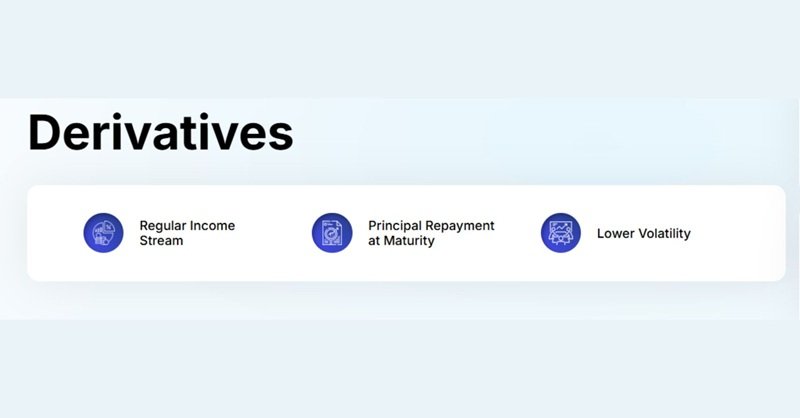When people think of investing, they often imagine stocks, mutual funds, or gold. However, there is also a fast-moving and often misunderstood area called derivative investments. Every day, billions of dollars flow through these markets, helping companies manage risks, banks develop solutions, and investors find opportunities.
From traders managing risks to airlines protecting against fuel costs, or investors looking to increase stock returns, derivatives play a crucial role. In this guide, we will explain what derivatives are, their function in investment banking, and how you can get started with equity derivatives using effective strategies.

What are Derivative Investments?
A derivative is a financial contract that gets its value from an underlying asset, such as stocks, bonds, commodities, currencies, or market indexes. Instead of purchasing the asset directly, you invest in a contract based on its price movements. In simpler terms, think of it like betting on the outcome of a cricket match without actually owning the team. Your profit or loss depends on how accurately you predict the result.
Types of Derivative Investments
Futures: Contracts to buy or sell an asset at a set price in the future.
Options: Contracts that give you the right, but not the obligation, to buy or sell at a predetermined price.
Swaps: Agreements to exchange cash flows, commonly used for interest rates or currencies.
Forwards: Custom contracts between two parties, usually traded over-the-counter.
Why Do Investors Use Derivatives?
Hedging (Reducing Risk): Derivatives help protect against unexpected price changes and provide stability to investments.
Speculation (Earning from Price Movements): Investors use them to predict where prices are headed, aiming for higher returns.
Leverage (Maximizing Potential): Derivatives allow for control over larger positions with a smaller investment, increasing both profit potential and risk.
Arbitrage (Finding Opportunities): They help investors profit from small price differences across markets, ensuring efficiency and potential gains.
In summary, derivative investments involve using derivative contracts to grow wealth, manage risks, or speculate on price movements.
Derivatives in Investment Banking
Derivatives are not just tools for individuals; they are also essential in investment banking and global finance. Investment banks create, trade, and manage derivatives worth trillions of dollars each year. Leading financial institutions like JM Financial Services use derivatives to help clients optimize risk and returns.
Roles of Derivatives in Investment Banking:
Risk Management: Help clients protect against risks such as fuel prices, currency changes, or interest rate fluctuations.
Structured Products: Banks create innovative products by combining derivatives with other assets, offering both safety and growth potential.
Market Liquidity & Price Discovery: Continuous trading keeps markets active, making it easy to buy and sell, while also ensuring fair prices.
Profit Generation: Banks trade derivatives themselves, using sophisticated strategies to generate profits.
What Are Equity Derivatives?
Equity derivatives are financial contracts that derive their value from stocks or stock indexes. Instead of buying shares outright, investors use these contracts to benefit from stock price movements. Essentially, they allow you to engage in the stock market without owning the actual shares.
There are two main types:
Equity Futures: A fixed agreement to buy or sell a stock or index at a specified price on a future date. Since both parties are bound by the contract, futures are often used to lock in prices (hedging) or take advantage of price movements (speculation).
Equity Options: A flexible contract that gives you the right, but not the obligation, to buy or sell at a certain price within a set time frame. Options are valuable tools because they allow investors to manage risks or trade strategically, while limiting losses to the amount paid for the contract.
In summary, equity derivatives offer an effective way to manage risks, leverage opportunities, and navigate stock markets without directly owning shares.
Why Are Equity Derivatives Significant?
Capital Efficiency: Control larger stock positions with relatively small investments.
Risk Management: Protect portfolios from sudden market downturns.
Flexibility: Earn returns in rising, falling, or stable markets with suitable strategies.
Accessibility: Gain exposure to stock price movements without directly owning shares.
How to Invest in Equity Derivatives
Getting started with equity derivatives is straightforward but requires knowledge and discipline. Here’s how to invest in equity derivatives step by step:
Open a Trading and Demat Account: Choose a broker that offers Futures & Options (F&O) trading. Trusted firms like JM Financial Services provide platforms to begin.
Understand the Basics: Learn how contracts function—expiry dates, strike prices, and premiums.
Start Small: Begin with index options or highly liquid stocks before exploring complex strategies.
Pick Your Strategy:
Bullish? Buy call options or futures.
Bearish? Buy put options or short futures.
Need protection? Hedge your portfolio with options.
Monitor and Exit: Derivatives change quickly—set clear exit plans to lock in profits or minimize losses.
Manage Risk: Never invest more than you can afford to lose. Use stop-loss orders and position sizing.
In Conclusion
Derivatives are not just complicated financial tools; they are powerful instruments that drive modern markets. For individual investors, they offer protection, flexibility, and the chance to increase returns. With derivative investments, you gain smarter ways to manage risk and discover opportunities beyond traditional investing. Whether through derivatives in investment banking or learning how to invest in equity derivatives for personal growth, the key is knowledge and discipline.
The markets are already moving—the real question is, are you ready to move with them?
SocialTitli is your complete online business optimization partner, offering end-to-end digital marketing solutions to drive long-term success.
Our team includes expert digital marketers, software professionals, creative designers, and skilled content writers – all working together to help you reach your business goals.


